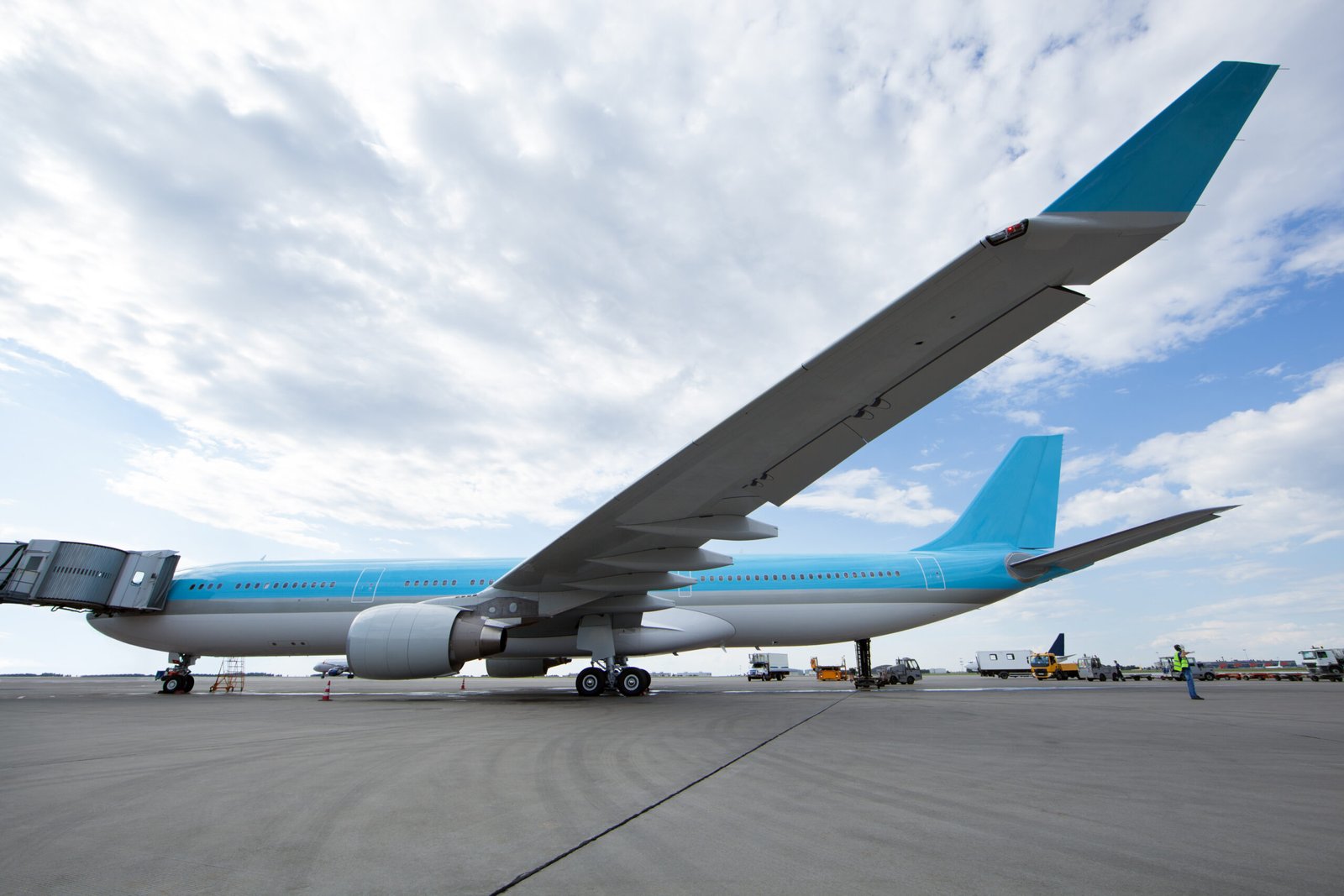Aviation Social Media
The Sky’s the Limit: Exploring the Future of Aviation Technology
As we soar into an era defined by rapid technological advancements, aviation is on the brink of a transformative leap. The future promises not just innovations in aircraft design and performance but also profound changes in how aspiring aviators are trained. For those eager to take to the skies, understanding the diverse pathways available through aviation schools can be a game-changer.
Aviation education is not one-size-fits-all; it encompasses various types of courses that cater to different interests and career goals. **Pilot training programs**, for instance, are often the most sought after. These typically include Private Pilot Certificates, Instrument Ratings, and Commercial Pilot Licenses. For those drawn to behind-the-scenes operations, **air traffic control courses** offer specialized training in managing air traffic safely and efficiently. Additionally, **aviation management programs** provide insights into the business side of flying—perfect for future executives looking to steer airlines or airports.
If your passion leans towards engineering or technology, consider enrolling in **aviation maintenance technician programs**. These courses dive deep into aircraft systems and maintenance protocols, ensuring safety remains paramount. Furthermore, with drone technology rising exponentially in popularity, many institutions now offer courses specifically focused on Unmanned Aircraft Systems (UAS). This exciting area is shaping up to be a cornerstone of modern aviation.

Navigating this educational landscape requires reliable resources to stay informed about industry trends and technologies. A plethora of aviation blogs and websites can offer insightful perspectives on everything from policy changes to emerging tech innovations. Some standout blogs include *AirlineReporter*, which keeps enthusiasts updated on airline news with a touch of humor and personal anecdotes. Meanwhile, *The Air Current* dives deep into industry analysis with expert opinions that can shape your understanding of the market.
Social media platforms also serve as vibrant communities for aviation lovers. LinkedIn groups focused on specific sectors—like commercial piloting or aerospace engineering—provide networking opportunities that could lead directly to job prospects post-graduation. Instagram features stunning imagery from pilots showcasing breathtaking views from above #AvGeek style; follow accounts like @FlyingWithFish or @FlightChops for daily inspiration!
For hands-on experience essential for becoming a skilled pilot or technician, pursuing an FAA-approved flight school is critical. Many flight schools across the country meet rigorous standards set by the Federal Aviation Administration (FAA), ensuring students receive top-notch training in both practical skills and safety protocols. Schools like *ATP Flight School* offer accelerated programs designed for those who want to earn their licenses swiftly while still being thorough in their instruction.
In addition to traditional flight schools, innovative simulator training facilities have emerged as vital resources for developing skills without leaving the ground. Advanced simulators replicate real-world flying conditions without risking lives or aircraft; they allow students to practice emergency procedures extensively before taking off solo.
As we look ahead at all these developments within aviation education and technology—whether it’s through traditional schooling methods or cutting-edge simulation—it’s clear that we’re only beginning our journey toward redefining what it means to fly.

In conclusion, whether you’re aiming high as a pilot or grounded in management roles within aviation industries, there’s no shortage of paths to explore—the sky truly is limitless! Embrace these opportunities as they unfold—they might just pave your way toward soaring success!
Sky’s the Limit: Exploring the Most Iconic Aircraft of All Time
Aviation has captivated humanity for over a century, transforming dreams of flight into tangible reality. From the Wright brothers’ first powered flight to modern supersonic jets, the journey through aviation history is nothing short of remarkable. But as we reflect on these iconic aircraft, we also recognize the importance of education and community in shaping future aviators. Let’s dive deeper into aviation schools, resources available online, and FAA-approved training programs.
### Aviation Schools: Navigating Your Path
When it comes to pursuing an aviation career, educational institutions offer a variety of courses tailored to different interests. Generally, aviation schools can be categorized based on their specialized programs:
1. **Pilot Training Schools**: These institutions focus primarily on preparing students for piloting careers. Courses typically include Private Pilot License (PPL), Commercial Pilot License (CPL), and Instrument Rating.
2. **Aviation Maintenance Programs**: For those interested in the technical side of flying, these programs teach essential skills for aircraft maintenance and repair. Students learn about airframe and powerplant mechanics among other disciplines.
3. **Aerospace Engineering Courses**: These are ideal for individuals fascinated by designing aircraft or spacecraft. Curriculum often covers aerodynamics, propulsion systems, and materials science.
4. **Air Traffic Control Training**: Catering to aspiring controllers, these courses delve into navigation systems and traffic management protocols necessary for ensuring safe skies.
5. **Flight Attendant Training Programs**: Tailored towards customer service in aviation, these classes prepare students for safety procedures and passenger management.
By mapping out your goals within these categories, you can select a course that aligns perfectly with your aspirations in aviation.
### Online Resources: Connecting Aviators Worldwide
With the digital age at our fingertips, finding reliable information about aviation has never been easier. Here are some popular blogs and websites where enthusiasts can learn more or connect with others who share their passion:
**Airliners.net**: This platform is home to a vibrant community where users share photos and stories related to commercial airlines.
**Flying Magazine**: A staple in aviation journalism that covers everything from pilot training tips to reviews of new aircraft.
**Plane & Pilot Magazine**: This site focuses on general aviation topics with useful articles about flying techniques and equipment.
**AvGeekery.com**: Bringing together avid fans of all things aerospace, this blog showcases news updates along with unique historical insights.
Social media platforms such as Instagram or Twitter also foster communities around specific aircraft types or flying experiences using trending hashtags like #AvGeek or #PilotLife.
### FAA Flight Schools & Simulators
For serious aspirants ready to take off into their flying careers, choosing an FAA-approved school is crucial. The Federal Aviation Administration ensures that training meets rigorous standards across various programs:
1. **FAA Part 61 Schools** offer flexible training schedules tailored for both part-time learners or full-time students seeking quick licensure.
2. **FAA Part 141 Schools**, on the other hand, provide structured courses with defined curricula—ideal for those looking at professional pilot pathways.
Many airports now feature state-of-the-art simulators allowing you to experience flight without leaving Earth’s surface! These simulators replicate real-world conditions while providing invaluable hands-on experience before taking command of an actual aircraft.

In conclusion, whether you dream of soaring through the clouds as a pilot or prefer maintaining the machines that make it all possible—aviation offers countless opportunities waiting just above us! Embrace your passion; after all—the sky’s truly the limit!
From Gliders to Jets: A Journey Through Aviation History
Aviation, a marvel of human ingenuity, has transformed the skies from simple gliders to sophisticated jets. This journey through aviation history is not just about technological advancements; it’s also about education and community. Whether you’re an aspiring pilot or simply intrigued by flight, understanding the various facets of aviation can be quite enlightening.
*Aviation Schools by Types of Courses**
Enrolling in an aviation school is a critical step for anyone looking to take to the skies. Various types of courses cater to different interests within the field. Here’s a breakdown:
1. **Pilot Training Programs**: These are designed for those aiming to become licensed pilots. They cover everything from private pilot licenses (PPL) to commercial and airline transport pilot licenses (ATPL).
2. **Aircraft Maintenance Programs**: If engines and airframes excite you, these courses teach how to maintain aircraft safely and efficiently. Students learn about systems, repair techniques, and regulatory compliance.
3. **Aeronautical Engineering Degrees**: For those drawn towards innovation behind aircraft design, aeronautical engineering courses delve into aerodynamics, propulsion systems, and structural analysis.
4. **Air Traffic Control Training**: Aspiring air traffic controllers can find specialized programs that prepare them for managing flights safely within controlled airspace.
5. **Drone Pilot Certification**: The rise of unmanned aerial vehicles has led to a surge in demand for drone pilot training programs focusing on regulations and operational skills.
Each type of course offers unique insights into the vast world of aviation while equipping students with essential skills needed in their chosen path.
*Lists of Aviation Blogs, Websites, Social Media Sites**
The aviation community thrives on sharing knowledge and experiences through various platforms. Here are some must-visit blogs and websites:
**The Points Guy**: Focused on travel tips, credit card rewards related to airlines.
**Airline Reporter**: Offers insights into airline industry news along with reviews.
**Flying Magazine Blog**: A treasure trove for pilots featuring tips on flying techniques.
**Jetwhine**: Covers topics ranging from airline operations to safety issues.
For social media enthusiasts:
Follow hashtags like #AvGeek on Twitter and Instagram for stunning photos and discussions.
Join Facebook groups such as “Pilots Without Borders” or “Flight Simulation Enthusiasts” where members share advice and experiences.
These online spaces foster camaraderie among aviation lovers while helping newcomers navigate their way through this exciting sector.
*FAA Flight Schools/Airplane Schools/Simulators**
The Federal Aviation Administration (FAA) plays a vital role in certifying flight schools across the United States that meet stringent safety standards. When searching for FAA-approved schools, consider factors such as location, curriculum offerings, instructor qualifications, and fleet condition.
Additionally, many flight schools incorporate simulators into their training programs—an excellent way for students to practice maneuvers without leaving the ground! Simulators provide realistic environments where potential pilots can hone their skills effectively before taking off in real aircraft.

Some well-regarded FAA-certified flight schools include:
1. **Embry-Riddle Aeronautical University**
2. **ATP Flight School**
3. **Purdue University**
4. **Florida Institute of Technology**
Choosing the right school can set you on an exciting path filled with opportunities in this ever-evolving industry.
In conclusion, from early gliders that floated gently through the air to today’s high-speed jets soaring above clouds — aviation continues its remarkable journey fueled by innovation and education. By exploring various educational avenues available today—from specialized courses at accredited schools to engaging blogs—the sky truly is not the limit; it’s merely the beginning!
Flight Secrets: Inside the Life of an Airline Pilot
Ever gazed up at a soaring aircraft and wondered what it takes to be the one in command? The life of an airline pilot is a blend of exhilaration, responsibility, and continuous learning. However, before donning those aviator sunglasses and striding into the cockpit, aspiring pilots must navigate through an array of aviation schools, training programs, and resources that provide the foundation for their careers.

## Aviation Schools and Courses
Aviation education is not a one-size-fits-all endeavor; it varies significantly depending on individual goals. Here’s a breakdown of some popular types of courses offered:
1. **Private Pilot License (PPL)**: This fundamental course introduces flying basics. Ideal for hobbyists or those wanting to fly small aircraft.
2. **Commercial Pilot License (CPL)**: Once you’ve mastered your PPL, this course prepares you for a professional career in aviation, allowing you to get paid for your flying skills.
3. **Instrument Rating**: Essential for flying in various weather conditions, this training focuses on navigation using instruments rather than visual cues.
4. **Flight Instructor Certificate**: After gaining experience, many pilots choose to instruct others—this certification allows you to teach aspiring pilots.
5. **Airline Transport Pilot (ATP)**: The pinnacle of pilot training, ATP certification opens doors to airline jobs and requires extensive flying hours along with rigorous testing.
Each institution offers unique programs tailored to different needs; hence research is crucial when selecting an aviation school that aligns with your aspirations.
## Aviation Resources Online
In today’s digital age, connecting with fellow aviation enthusiasts or experts has never been easier! Here’s a curated list of engaging blogs, websites, and social media platforms dedicated to aviation:
**Airliner Cafe**: A vibrant forum where aviation lovers discuss everything from aircraft design to flight experiences.
**The Points Guy**: A blog focused on maximizing travel rewards—perfect for pilots looking to make the most out of their layovers!
**JetWhine**: A mix of opinions and news about current trends in aviation—the perfect resource for keeping informed on industry changes.
**Aviation Week Network**: Comprehensive coverage on aerospace technology and defense—a go-to site for industry professionals seeking cutting-edge information.
**Instagram & Twitter Accounts** like @PilotLife and @AviationGeeks offer daily doses of stunning aerial photography alongside insights from seasoned pilots.
These resources foster community engagement while providing invaluable knowledge about the intricacies of flying.
## FAA Flight Schools & Simulators
The Federal Aviation Administration (FAA) plays a vital role in certifying flight schools across the United States. When choosing an FAA-approved school, look for institutions that utilize advanced simulators along with real-world flight experience. These facilities provide immersive environments that replicate actual cockpit scenarios—an essential tool for honing skills without leaving the ground!
A few notable FAA-certified flight schools include:
**Embry-Riddle Aeronautical University**: Renowned globally for its aviation programs.
**Purdue University Aviation Technology Program**: Offers a comprehensive curriculum complemented by state-of-the-art simulators.
**Florida Institute of Technology**: Known for its hands-on approach combining academic rigor with practical application through simulations.
In conclusion, embarking on the journey towards becoming an airline pilot involves much more than just mastering takeoffs and landings—it’s about dedication to learning within a dynamic field filled with opportunities. With numerous courses available at various institutions alongside online resources paving your way forward, taking off into this exhilarating career has never been more accessible! So buckle up; adventure awaits!
Soaring High: The Future of Aviation Technology
As we glide into a new era of aviation, the horizon is rich with opportunities for aspiring pilots and aviation professionals. The landscape of aviation education is evolving, offering diverse paths tailored to various interests and career aspirations. Whether you are captivated by the mechanics of flight or the intricacies of air traffic control, there’s an educational track designed just for you.
Aviation schools have diversified their curriculums to encompass a broad spectrum of courses. For those aiming to become pilots, traditional flight training programs remain a staple; however, many institutions now offer specialized tracks including commercial pilot training, instrument ratings, and multi-engine certifications. Other courses delve into the technical aspects—aircraft maintenance programs provide students with hands-on experience in maintaining and repairing aircraft systems.

For individuals drawn to the business side of aviation, management courses are essential. These programs cover everything from airport operations to airline management strategies. Additionally, flight dispatchers can find dedicated training that prepares them for critical roles in ensuring safe and efficient flights. With the rise of drone technology, schools also offer drone pilot certifications—a reflection of how rapidly this sector is expanding.
In today’s digital age, staying informed about innovations in aviation technology is crucial. A wealth of resources exists online for enthusiasts and professionals alike. Some notable blogs include “AirlineReporter,” which covers industry news with a focus on airlines’ operations and passenger experiences, as well as “The Points Guy,” which provides insights into travel rewards related to flying. Websites like “FlightAware” offer real-time tracking information on flights around the globe while forums such as “PPRuNe” (Professional Pilots Rumour Network) facilitate discussions among aviation professionals.
Social media has also emerged as a vital platform for connecting with fellow aviators and staying updated on trends. Twitter accounts like @AvGeekery celebrate all things aviation through stunning imagery and engaging content while Instagram pages such as @FlyingtheSkies showcase breathtaking aerial views that inspire wanderlust. LinkedIn groups focused on aerospace careers create networking opportunities that can be invaluable in furthering one’s career.
If you’re considering pursuing your dreams within this thrilling field, FAA-approved flight schools are your launching pad. These institutions adhere strictly to federal regulations ensuring high-quality training standards across the board. Schools like Embry-Riddle Aeronautical University not only provide robust pilot training but also boast programs in aeronautics engineering and air traffic management.
For those who may hesitate due to time constraints or budget considerations, simulators present an excellent alternative for immersive learning experiences without leaving the ground. Flight simulator platforms range from sophisticated setups used by commercial pilots to more accessible options available at local flight schools or even home versions catering to hobbyists eager for realistic flying experiences.
With advancements in technology shaping every aspect of our lives—including how we travel—the future of aviation promises exciting innovations that will redefine our skies. As electric aircraft take center stage alongside sustainable fuels, educational institutions continue adapting their offerings to prepare students for these changes.
Whether you’re embarking on your journey through an aviation school or simply seeking knowledge through online platforms and communities, remember that every moment spent learning brings you closer to soaring high above those clouds! Embrace this dynamic world where passion meets technology—your adventure awaits!




